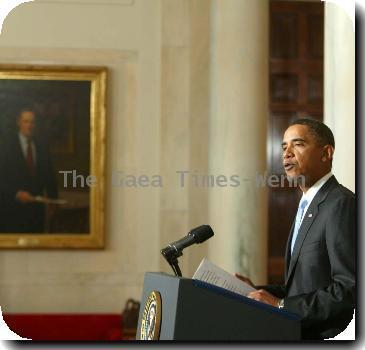Congress sends Obama $18 billion jobless benefits bill despite deficit worries
By APThursday, April 15, 2010
$18 billion jobless benefits bill goes to Obama
WASHINGTON — Just hours after Congress passed an $18 billion bill to restore unemployment benefits for the long-term unemployed, President Barack Obama made it the law of the land.
The measure comes as welcome relief to hundreds of thousands of people who lost out on the additional weeks of compensation after exhausting their state-paid benefits. They now will be able to reapply for long-term unemployment benefits and receive those checks retroactively under the legislation.
The bill also restores full Medicare payments to doctors who were threatened by a 21 percent cut and refloats the flood insurance program.
Obama signed the bill when he returned to the White House on Thursday night from fundraisers in Miami and a speech earlier in the day at Cape Canaveral, presidential spokesman Bill Burton said.
Obama thanked Congress for passing the temporary extension, saying it was critical to help struggling families make ends meet.
“Millions of Americans who lost their jobs in this economic crisis depend on unemployment and health insurance benefits to get by as they look for work and get themselves back on their feet,” Obama said in a statement. “But as I requested in my budget, I urge Congress to move quickly to extend these benefits through the end of this year.”
The legislation cleared both houses of Congress on Thursday night. The House passed the bill 289-112 just two hours after it emerged from the Senate on a 59-38 vote that capped an unusually partisan debate. Republicans largely chose to take a stand against the legislation for adding to the $12.8 trillion national despite backing it by wide margins in December and again recently.
“It increases the deficit by $18 billion, a cost to be paid for by future generations,” said Rep. Jerry Moran, R-Kan. “This legislation is yet another unfortunate example of business as usual in our nation’s capital.”
Several other popular programs had also expired, including federal flood insurance, higher Medicare payment rates for doctors and generous health insurance subsidies for people who have lost their jobs.
The situation became more urgent Thursday afternoon when Medicare announced that it would start paying doctors’ claims at a 21 percent lower rate. That won’t be necessary now.
Thursday’s measure provides up to 99 weekly unemployment checks averaging $335 to people whose 26 weeks of state-paid benefits have run out. It’s a temporary extension through June 2 that gives House and Senate Democrats time to iron out a measure to fund the program through the end of the year.
Fewer than 1 in 3 House Republicans voted for the measure. Just three Senate Republicans did. The sole Democrat to oppose it was longtime budget hawk Rep. Jim Cooper of Tennessee.
The bill also extends a program created under last year’s economic stimulus bill that gives unemployed people a 65 percent subsidy on health care premiums under the so-called COBRA program.
On successive votes earlier in the day, Democrats narrowly turned back two amendments by Sen. Tom Coburn, R-Okla., that would have paid for the measure over time by cutting spending and raising almost $10 billion in revenues with a variety of Democratic-backed ideas to tighten the tax code. One of Coburn’s amendments was killed by a 50-48 vote.
The topic of providing additional weeks of jobless benefits in the midst of bad times had been regarded as routine. But with conservative voters and tea party activists up in arms about the deficit, conservative Senate Republicans upset about the deficit have twice caused interruptions of jobless benefits and other programs.
In February, Jim Bunning, R-Ky., single-handedly blocked an extension of unemployment benefits in an unsuccessful bid to force Democrats to pay for them. The measure passed on a 78-19 vote after Republicans were smacked by a public relations backlash.
But many Republicans believe it was a stand worth taking, including Coburn, who blocked a vote last month on another short-term extension.
By the time Senators returned from a two-week recess on Monday, only four Republicans — Susan Collins and Olympia Snowe of Maine, Scott Brown of Massachusetts and George Voinovich of Ohio — voted with Democrats to defeat a GOP filibuster of the bill. Only Voinovich, Collins and Snowe voted for the bill on Thursday.
Democrats said it was the wrong topic for Republicans to take a stand on the deficit after voting for tax cuts, wars and a new Medicare drug benefit without paying for them.
“They seem to have discovered fiscal responsibility when it comes time to extend unemployment benefits but not when it came to paying for tax cuts for the rich and the Iraq war,” said Rep. Sander Levin, D-Mich.
Twenty-one Senate Republicans voted for the earlier extension last month and House GOP leaders opted against even forcing a vote. But Thursday’s vote came after senators spent two weeks among their constituents — and as thousands of tea party activists came to Washington to protest on deadline day for filing taxes.
“I think people spent two weeks out listening to people about spending and debt,” Coburn said.
The House has twice this year approved short-term extensions of jobless benefits and other expired programs.
The various programs in the longer-term legislation represent much of the Democrats’ remaining agenda on job creation. One of the reasons the short-term legislation was needed is that House and Senate Democrats are having difficulty resolving their differences on how to pay for a package of expired tax breaks for individuals and businesses.
Other elements of the jobs agenda such as cash to build roads and schools and help local governments keep teachers on the payroll, remain on the shelf for a lack of money to pay for them.
Democrats said deficit-financed jobless benefits not only needed to help people unable to find work but that they are one of the most effective ways to pump up the still-struggling economy.
(This version CORRECTS that Medicare payments are being restored.)
Tags: Barack Obama, Government Programs, Government-funded Health Insurance, Labor Economy, North America, Political Organizations, Political Parties, Tea party, United States, Washington






